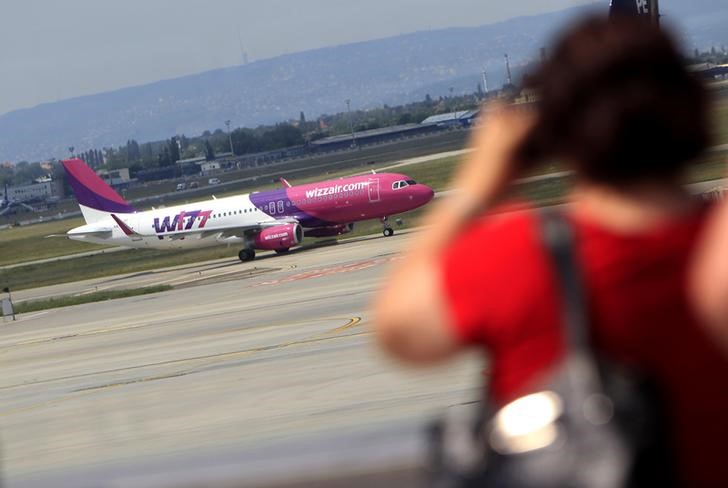TSX lower after index logs fresh record closing high
Investing.com -- Wizz Air (LON:WIZZ) has been upgraded to “overweight” from “equal weight” by Barclays (LON:BARC), with the price target raised to £15 from £11, reflecting a shift aimed at recalibrating the airline’s long-term growth trajectory and capital structure, in a note dated Friday sending its shares up over 9%.
Barclays cited a series of positive decisions that mark a break from the more aggressive strategy previously pursued by the company.
The brokerage flags Wizz Air’s decision to exit its Abu Dhabi business, scale back fleet expansion, and shift toward aircraft ownership as evidence of more disciplined planning.
The airline intends to reduce its growth rate from the previously targeted 20% to a more moderate range closer to 10-12%, with analysts favoring even slower expansion.
Capacity growth is now aligned with GDP growth in its core Central and Eastern European markets, which Barclays projects to be 4.5% for Hungary and 4.1% for Poland in 2025.
A central point in the upgrade is the reduction in Wizz’s order for Airbus A321XLR aircraft. The planned order will be cut from 47 to between 10 and 15 aircraft, reversing what Barclays had previously viewed as a risky move into speculative long-haul markets.
The brokerage has been consistently critical of Wizz Air’s aggressive fleet strategy, warning that it echoed the failed expansion attempts of carriers such as Flybe and Norwegian Air Shuttle.
Additionally, the airline plans to increase the share of owned aircraft on its balance sheet to between 40–50% by 2030, shifting away from its reliance on sale and leaseback financing. Barclays supports this move, noting that while this will increase near-term pressure on leverage, it should ultimately reduce aircraft ownership costs and bolster cash flow and EBITDA.
The analysts described the A321neo, a primary component of Wizz’s future fleet, as “the most efficient aircraft available today”.
Despite these changes, execution risks remain. Barclays pointed to Wizz Air’s mixed track record and the complexity of renegotiating aircraft delivery terms with Airbus.
The analysts also flagged short-term financial pressures, including higher non-fuel costs and one-off expenses associated with the Abu Dhabi exit.
As a result, Barclays cut its net profit estimates for fiscal years 2026 and 2027 by 32% and 17%, respectively.
However, the brokerage raised its forecast EBIT margin for FY28 to 8.6% from 8.2% and boosted its assumed mid-term EBIT margin to 7.8% from 6.5%, which helped justify the price target increase.
At the new price target, Wizz would trade at 5.7 times estimated FY28 earnings. The analysts acknowledged that while recent strategic decisions do not erase the financial consequences of past missteps, they signal a more sustainable path forward.
The brokerage now sees a “far brighter future” for Wizz Air under a revised, more modest growth model centered on the Central and Eastern European region.
